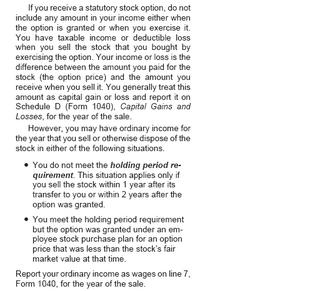Thursday, June 30, 2005
I exercised some stock options in 2003. I did a "same-day" sale, where I exercised the stock options (bought the shares at a discount) and sold the shares on the same day. A same-day sale was the only choice I had on the smithbarney.com site, and it's the one I wanted, so that's fine. Smith Barney (part of CitiGroup) was the broker who exercised the options and the broker who sold the shares. CitiGroup took their cut for transaction fees, sent the amount due to me to my employer. My employer withheld taxes, cut me a check, and reported the amount of the check as ordinary income on my form W-2. At the end of the year, I got my W-2, reported this stock options income along with my other income. This is basically what the IRS says to do in Publication 525 for 2003 (PDF) . Notice the last line: "Report your ordinary income as wages on line 7, Form 1040, for the year of the sale". It doesn't get much clearer than that.

All was well. Or so I thought.
I also got a 1099 from CitiGroup, saying that CitiGroup had sold shares on my behalf. I didn't think much of it, because the income from this sale was on my W-2. I didn't make any mention of this 1099 on my income taxes.
Big mistake.
Fast-forward to June 2005. Somewhere between the end of 2003 and June 2005, CitiGroup reported the amount from the stock sale to the IRS. They reported the gross amount from the sale of the shares. They did not report the amount that I had spent to buy the shares from them when I exercised the options (a millisecond before I sold the shares). From CitiGroup's report, one would think that a little birdie gave me the stock. The IRS gets CitiGroup's report and thinks, "Hey, this guy made a ton of money by selling shares and didn't report any of it to us. Let's audit him." Which is exactly what they did.
So now I have to write a letter to the IRS saying that, no, I didn't actually get the stock from a little birdie, I bought it from CitiGroup a millisecond before I sold it. I also have to fill out an amended Schedule D saying that I had sold shares, but made no money off of them. (I can't say that I made money, because I already reported that money as income, and I have no desire to pay taxes twice on the same money). The way to do this is to report on Schedule D that I sold the shares, but the cost basis was the same as the sale price. How do I do this when I really made money on the sale? I have to increase the amount that I paid for the shares by the amount of income I received from the transaction. Does this make sense? If it does, when did you get your CPA?
I found some very helpful web sites on the topic. After the fact, of course. I now I have to clean up the mess.

All was well. Or so I thought.
I also got a 1099 from CitiGroup, saying that CitiGroup had sold shares on my behalf. I didn't think much of it, because the income from this sale was on my W-2. I didn't make any mention of this 1099 on my income taxes.
Big mistake.
Fast-forward to June 2005. Somewhere between the end of 2003 and June 2005, CitiGroup reported the amount from the stock sale to the IRS. They reported the gross amount from the sale of the shares. They did not report the amount that I had spent to buy the shares from them when I exercised the options (a millisecond before I sold the shares). From CitiGroup's report, one would think that a little birdie gave me the stock. The IRS gets CitiGroup's report and thinks, "Hey, this guy made a ton of money by selling shares and didn't report any of it to us. Let's audit him." Which is exactly what they did.
So now I have to write a letter to the IRS saying that, no, I didn't actually get the stock from a little birdie, I bought it from CitiGroup a millisecond before I sold it. I also have to fill out an amended Schedule D saying that I had sold shares, but made no money off of them. (I can't say that I made money, because I already reported that money as income, and I have no desire to pay taxes twice on the same money). The way to do this is to report on Schedule D that I sold the shares, but the cost basis was the same as the sale price. How do I do this when I really made money on the sale? I have to increase the amount that I paid for the shares by the amount of income I received from the transaction. Does this make sense? If it does, when did you get your CPA?
I found some very helpful web sites on the topic. After the fact, of course. I now I have to clean up the mess.